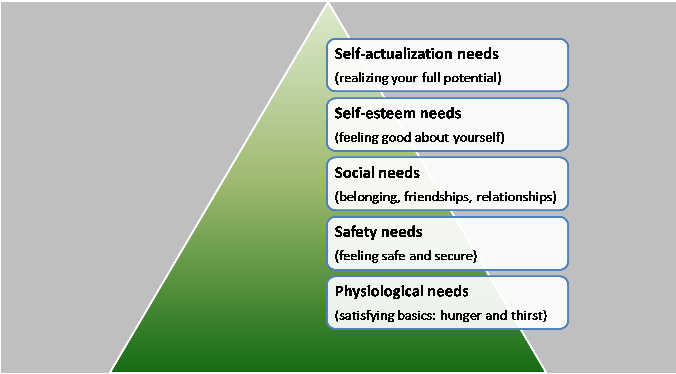Explain the Different Motivational Theories and Their Application
Motivational Theory and Application There are as many motivational theories as there are people to motivate. The content theories of motivation identify what motivates people while process theories deal with cognitive antecedents that go into motivation and effort.

Maslow Motivation Theory The Hierarchy Of Needs The Happy Manager
The main content theories of motivation are Maslows Hierarchy of Needs Alderfers ERG Theory McClellands Three Needs Theory Herzbergs Two Factor Theory and McGregors Theory X and Theory Y.

. The equity theory Process theories explain how satisfaction comes about as opposed to what causes motivation. Douglas Mc Gergors X Y Theory. Maslow is often-quoted still today having developed a seminal theory of the needs of human beings.
Maslows Need Hierarchy Theory 2. The process theories deal with How the motivation occurs ie. Theories of Motivation and Their Application in Organizations.
The hierarchy is shown below. Staff first want to meet their survival needs by earning a good wage. He suggested there are five hierarchies or levels of need that explain how people are motivated.
Process theories of motivation provide an opportunity to understand thought processes that influence behavior. In the theory of motivation the subject wants to minimize pain and increase pleasure. McClellands Need Theory 4.
These theories contribute to the complex processes involved in motivational effort. We focus on two dissimilar theories which initially seem in opposition to each other. Intrinsic motivation and extrinsic motivation.
Here is a very minimalistic overview of 8 of the 20 theories of motivation I brainstormed before writing this article. The following theories are considered contemporary or modern not only because they necessarily were developed recently but because they represent the current state of the art in explaining employee motivation. Through proper development and application we see the ability to use both in the mergeracquisition scenario.
TMT argues that as a deadline for completing an activity nears the perceived usefulness or benefit of that activity. Its time to turn motivation theories into practice. Process theories look at how people are motivated.
7 Modern or Contemporary Theories of Motivation. McGregors Participation Theory 5. Please note that their tenets and implications for the classroom have been overly simplified.
A Risk Analysis 47 namely relatedness being esteemsocial needs then growth being self-actualization and existence which is securityphysiological needs. The theory emphasizes time as a critical motivational factor and focuses on the impact of deadlines on the allocation of attention to particular tasks. From the lower level to higher level of needs.
Acquired Needs Theory by McClellands. The process of motivation and following theories were given in this context. Process theories include- Vrooms Expectancy Theory Porter-Lawler Model Adams Equity Theory Cognitive Evaluation Theory.
Motivation theories Motivation is a state-of-mind saturated with potential and passion which drives a soul to work in a positive way to accomplish wanted aims. Furthermore there are two types of motivation. Hence if you are keen to apply them to your specific teaching context you may want to find out more about them.
Some of the most important theories of motivation are as follows. Maslows theory of motivation Herzberg Motivation-Hygiene Theory Two-Factor Theory Vrooms Expectancy Theory Edwin Lockes goal-setting theory How to motivate your team 4 steps you can take right now. Intrinsic motivation has to do with enjoyment in the task one is involved in.
Different Types of Motivation Theories Abraham Maslows Hierarchy Theory Abraham Maslow first postulated that motivation of employees at the workplace generally depends on the satisfaction of their needs in order of hierarchy ie. Porter and Lawlers Expectancy Theory. Modern or contemporary motivation theories are.
Herzbergs Motivation Hygiene Theory 3. Urwicks Theory Z 6. The content theory of motivation mainly focuses on the internal factors that energize and direct human behavior.
Vrooms Expectancy Theory 8. Herzbergs and McGregors neo-human relations theories both focus on motivation and leadership but their theories are very different. Some of the famous motivation theories include the following.
Temporal motivation theory TMT is an integrative motivational theory developed by Piers Steel and Cornelius J. In this group we find a particular focus on human motivation including. Motivation is a power that drives a person to work with a high level of dedication and concentrate even if things are against him.

Motivation Theory Of Motivation Dentalimplantsurgery Com Custom Academic Help

Theories Of Motivation From The Concept To Your Company Upskill Coach
No comments for "Explain the Different Motivational Theories and Their Application"
Post a Comment